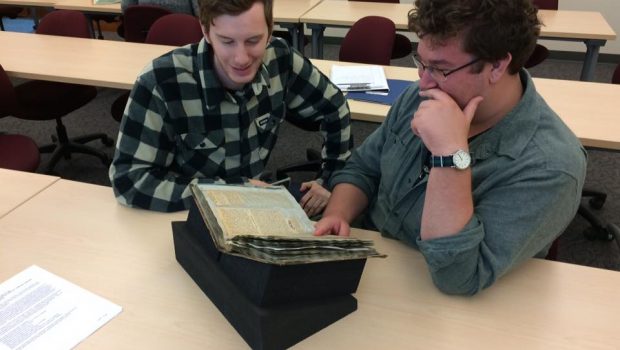On Thursday, we visited the UVic Archives in the basement of the McPherson Library. Here are Cole’s thoughts from later that same evening.
Today we visited the university archives to look for information regarding the cemetery. We were given a lesson on what archives do and how they work, and then we were able to see some pretty amazing documents.
The first thing that jumped out at me was the gigantic book on my table. It was several feet wide, and when opened, it took up most of the table. Inside were detailed maps of the city, specifically detailing which houses had fire insurance. This showed us how the city has grown in the last 80 years or so.
The next thing I looked at was the scrapbook and journal of Frank Sylvester, an important member of the turn-of-the-century Jewish community in Victoria. His journal was very interesting, and contained what appeared to be business records as well as more personal doodles and newspaper clippings. His scrapbook, on the other hand, was much more varied, and absolutely fascinating. It held all sorts of things, from century-old news stories taken directly from the paper and pasted into the book, to drawings and photographs of family members.
I also viewed Cecilia Sylvester’s scrapbook, which contained much of the same. She seemed to really enjoy the poetry, jokes, and stories published in the newspapers just as much as she liked the actual news stories, as there were plenty of them in between the larger news items.
The item I found most interesting was a program detailing the contemporary Governor General of Canada, Lord Stanley’s visit to Victoria in 1889. Admission cost 10 dollars, which is the equivalent of roughly 266 dollars today. The event was attended by seemingly every important organization in the city, from the clergy to the various clubs and organizations such as the Oddfellows.
One thing I noticed while reading these clippings and stories is the difference in the way we write today compared to how we wrote a hundred years ago. Even items such as obituaries could be incredibly detailed and personal, much more so than the 5-sentence blurbs we are accustomed to these days.
It was a very peculiar feeling, flipping through the pages of a book from the late 19th century, especially a book that was so personal to these people. As several of us discussed, it made things seem all the more real, and gave me a new level of respect for those we are studying as part of our fieldwork. One must always be respectful when working with a cemetery, and with those occupying it, but that has become much easier now that I know so much about these people’s lives.
